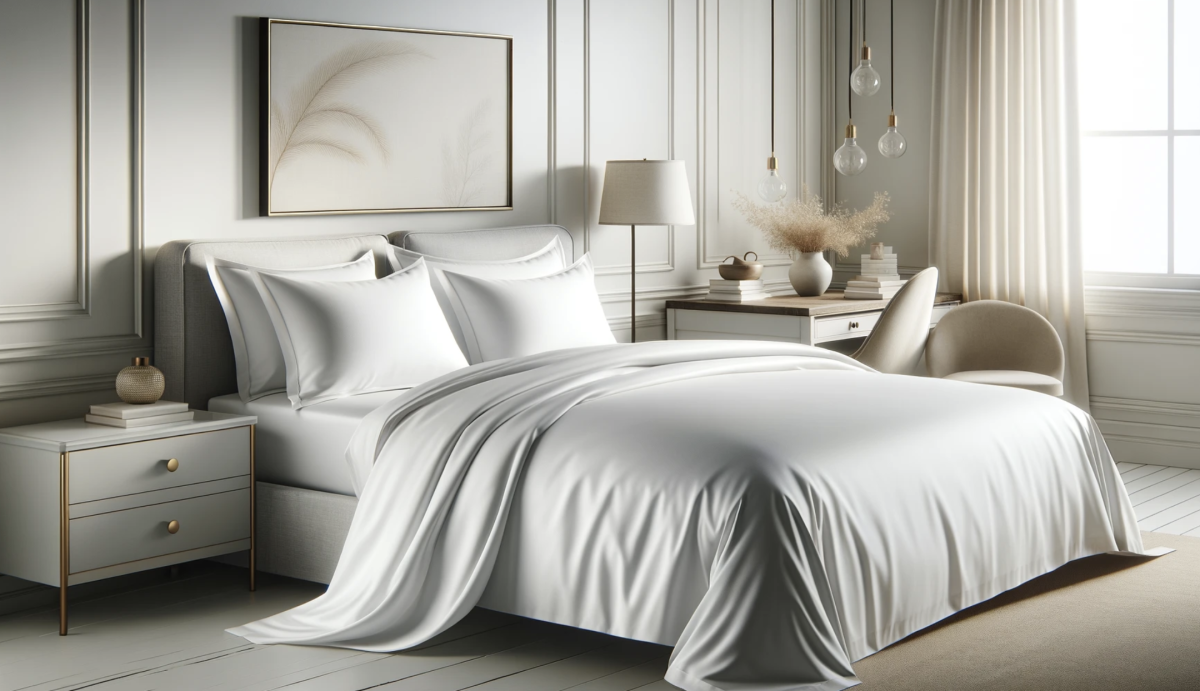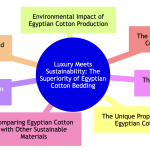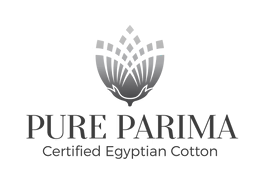Egyptian cotton bedding stands at the crossroads of luxury and environmental responsibility. Revered for its unparalleled softness and durability, it's a top choice for those who don't compromise on quality or ecological values. This fabric's journey from the lush Nile Valley to your bedroom encapsulates a story of sustainable luxury, making Egyptian Cotton sheets a favorite among discerning, eco-conscious consumers.
Key Takeaways
- Eco-Friendly Cultivation: Egyptian cotton is grown in the Nile River Valley, benefiting from natural irrigation and fertile soil. This reduces the need for artificial irrigation and chemical fertilizers, making it a more sustainable choice.
- Handpicking Method: The traditional handpicking method used in harvesting Egyptian cotton preserves the integrity of the fibers, minimizes energy consumption, and reduces the overall carbon footprint.
- Hypoallergenic Properties: Egyptian cotton is ideal for sensitive skin, thanks to its hypoallergenic nature. It's less likely to cause skin irritations or allergic reactions, making it suitable for all skin types.
- Unmatched Durability: The long fibers of Egyptian cotton create a fabric that withstands wear and tear, maintaining its quality over years of washing. This durability ensures long-lasting comfort and reduces the need for frequent replacements.
- Temperature Regulation: Egyptian cotton bedding is known for its breathability, which helps in regulating temperature. It keeps you cool in warm weather and warm in cooler conditions, ensuring comfort throughout the year.
- Sustainable Choice: The eco-friendly production process, combined with the durability and quality of Egyptian cotton, makes it a sustainable choice for bedding. It aligns with the values of environmentally conscious consumers who seek luxury without compromising on ecological responsibility.
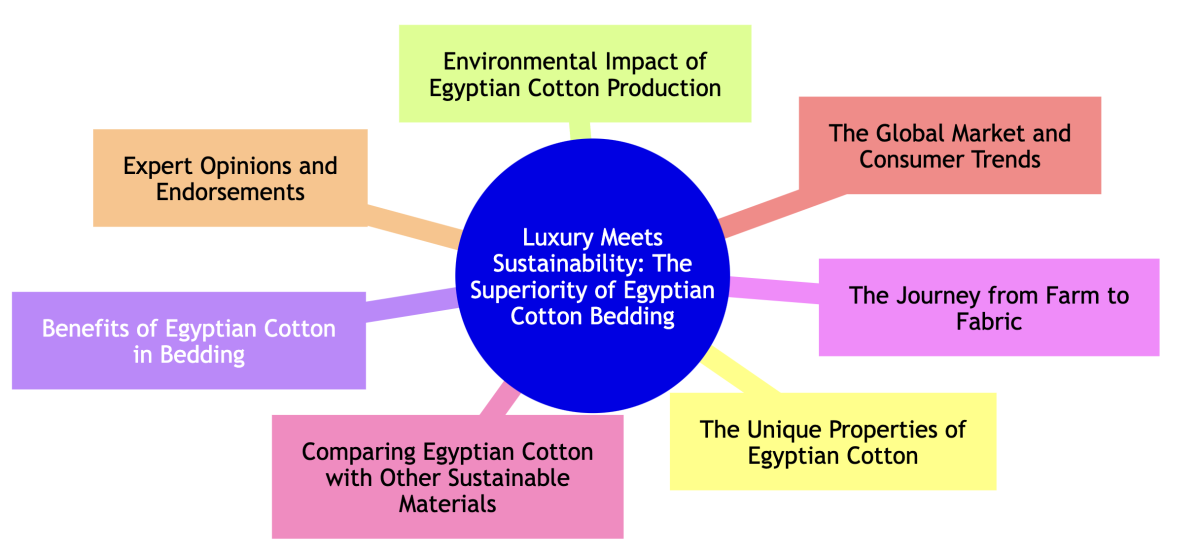
The Unique Properties of Egyptian Cotton
Egyptian cotton sets itself apart with its extraordinary characteristics. Its extra-long staple fibers, unmatched in length and strength, weave into bedding that's not only luxuriously soft but also incredibly durable. This cotton variety gets softer with each wash, ensuring a lasting comfort that's hard to find elsewhere.
Comparison of Egyptian Cotton with Other Types:
|
Feature |
Egyptian Cotton |
Regular Cotton |
Organic Cotton |
|
Fiber Length |
Extra-long |
Short to medium |
Medium to long |
|
Softness |
Exceptionally soft |
Moderately soft |
Soft |
|
Durability |
High |
Moderate |
Moderate to high |
|
Environmental Impact |
Lower water and chemical use |
Higher water and chemical use |
Low water and chemical use |
Environmental Impact of Egyptian Cotton Production
The cultivation of Egyptian cotton is a shining example of eco-friendly agriculture. Thriving in the Nile River Valley, this cotton benefits from the region's unique climatic conditions. The Nile's seasonal flooding provides natural irrigation, eliminating the need for artificial watering systems. This conserves water and ensures that the cotton grows in nutrient-rich, alluvial soil, reducing reliance on chemical fertilizers.
Moreover, the handpicking method employed in harvesting Egyptian cotton is a crucial aspect of its sustainable profile. This traditional technique ensures that the fibers are collected with minimal damage, maintaining their natural integrity. This approach contrasts sharply with mechanized harvesting, which often damages fibers and consumes more energy. By preserving the quality of the fibers, the handpicking method also extends the lifespan of the cotton, leading to less frequent replacements and, consequently, a lower environmental impact.
The production of Egyptian cotton also involves mindful practices to minimize waste and energy consumption. The processing of the cotton, from ginning to spinning, is carried out with an eye towards eco-efficiency, ensuring that every step of the process contributes to a smaller carbon footprint. This holistic approach to cultivation and processing makes Egyptian cotton a paragon of environmental stewardship in the textile industry.
Benefits of Egyptian Cotton in Bedding
Hypoallergenic
Opting for Egyptian cotton bedding brings a host of advantages, combining comfort with durability. Its hypoallergenic nature is a life-saver for those with sensitive skin or allergies. Unlike other materials that might irritate the skin, Egyptian cotton provides a smooth, gentle touch, reducing the likelihood of skin irritations or allergic reactions.
Durability
The durability of Egyptian cotton is unmatched. Its long fibers create a fabric that resists wear and tear, maintaining its quality and texture even after numerous washes. This resilience means that Egyptian cotton bedding doesn't pill or thin easily, ensuring that your investment remains in excellent condition for years to come.
Temperature Regulation
Another significant benefit of Egyptian cotton is its exceptional temperature regulation. The fabric's breathability allows for efficient air circulation, keeping you cool during warmer nights and snug when the temperature drops. This adaptability makes Egyptian cotton bedding suitable for a range of climates and seasons, providing year-round comfort.
Egyptian cotton's hypoallergenic properties, durability, and temperature regulation make it an ideal choice for bedding. These benefits, coupled with its sustainable production process, position Egyptian cotton as a superior choice for environmentally conscious consumers seeking luxury and comfort in their bedding choices.
The Journey from Farm to Fabric
Cultivation Practices
The cultivation of Egyptian cotton is a blend of tradition and innovation. The Nile Valley's unique climate and fertile soil create the perfect conditions for growing the Gossypium barbadense plant. Farmers in this region have honed their methods over centuries, ensuring a crop that's both high in quality and sustainable.
Harvesting Techniques
The harvesting of Egyptian cotton is a careful, labor-intensive process. Workers handpick the cotton, ensuring each fiber remains intact and straight. This meticulous approach is crucial for maintaining the cotton's signature length and strength.
Manufacturing Process
Once harvested, the cotton undergoes a rigorous process to become the bedding we adore. The fibers are spun into yarn and then woven into fabric. Throughout this process, attention to detail and quality control are paramount, ensuring the final product lives up to the high standards expected of Egyptian cotton.
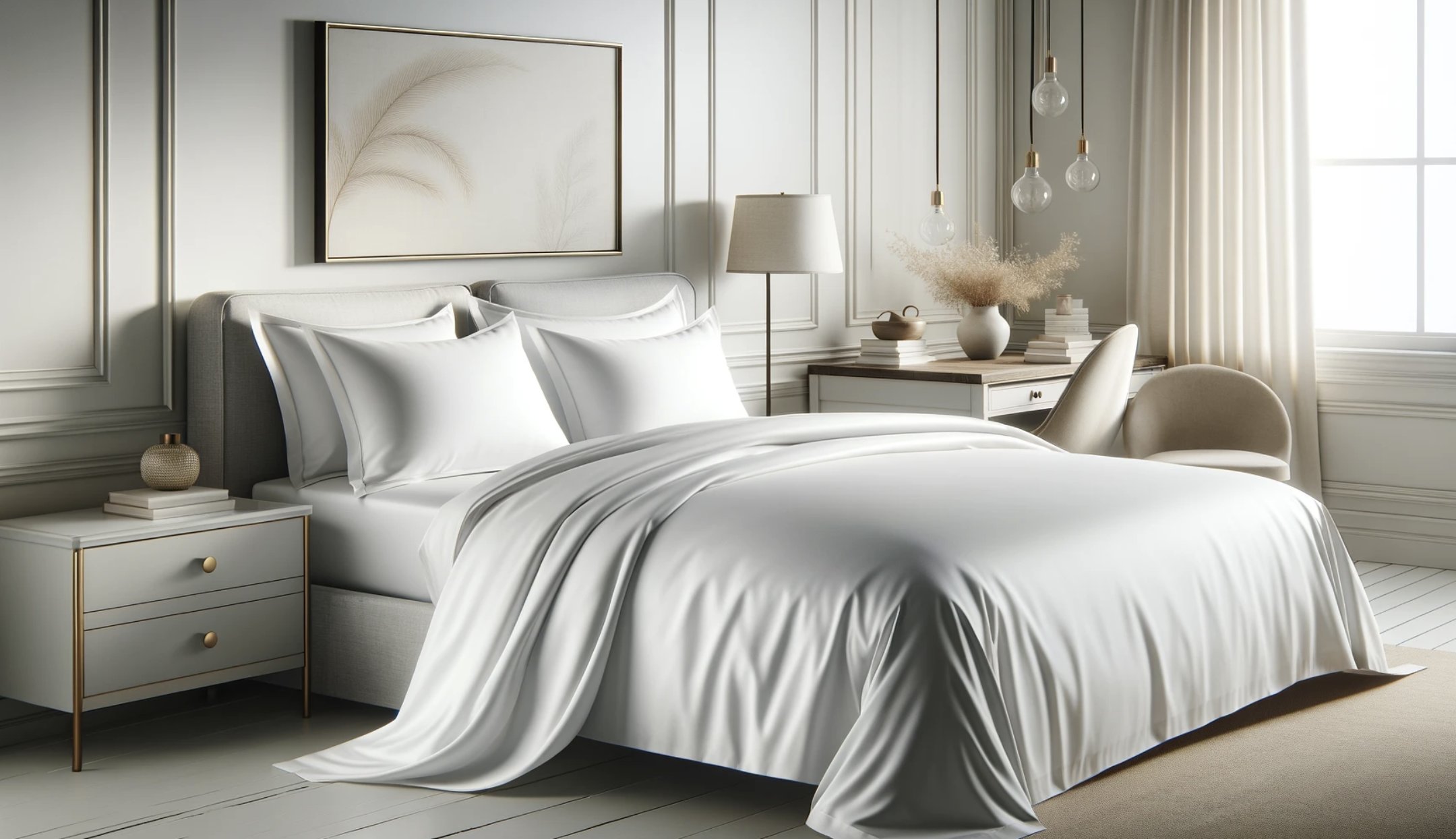
Comparing Egyptian Cotton with Other Sustainable Materials
When it comes to sustainable bedding, Egyptian cotton holds a significant edge. Its luxurious feel and eco-friendly cultivation set it apart from other materials.
Comparison of Egyptian Cotton with Other Sustainable Materials:
|
Material |
Comfort |
Sustainability |
Cost |
|
Egyptian Cotton |
Extremely high |
High |
Moderate-High |
|
Bamboo |
High |
Moderate-High |
Moderate |
|
Linen |
Moderate |
High |
Moderate |
|
Tencel |
High |
High |
Moderate |
This table illustrates that while alternatives like bamboo, linen, and Tencel offer sustainable benefits, Egyptian cotton leads to comfort and luxury.
Final Thoughts
Egyptian cotton bedding is more than a luxury - it's a sustainable choice for the environmentally conscious. Its unique properties, minimal environmental impact, and global appeal make it an unmatched option in the world of luxury bedding. For those looking to experience the pinnacle of comfort and sustainability, Pure Parima stands as the leading online retailer of Egyptian cotton sheets. Their commitment to quality and eco-friendly practices makes them the go-to choice for discerning customers who seek the best in luxury bedding.
